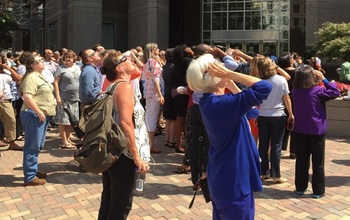Multimedia Gallery
Great American Solar Eclipse (Image 1)
On Aug. 21, 2017, across the country, people’s eyes were looking toward the skies to see the Great American Solar Eclipse. It was the first time in 99 years that a path of totality, about 70 miles wide, could be viewed in the U.S. from coast to coast, from Oregon to South Carolina. Many people traveled to parts of the country that were in the path of the total solar eclipse. Others not in the path of totality were still thrilled to see the partial solar eclipse. At the National Science Foundation's (NSF) headquarters in Arlington, Virginia, interested agency staff and associates gathered to witness the rare event. The eclipse reached almost 82 percent around 2:42 p.m., local time. The gathering served to mark another event as well -- the unofficial farewell to the agency’s Arlington building; between August and September, NSF relocated to Alexandria, Virginia.
Find out more about the solar eclipse in NSF's Solar Science Special Report. (Date image taken: Aug. 21, 2017; date originally posted to NSF Multimedia Gallery: Aug. 23, 2017) [Image 1 of 13 related images.]
Credit: Rob Margetta, NSF
Images and other media in the National Science Foundation Multimedia Gallery are available for use in print and electronic material by NSF employees, members of the media, university staff, teachers and the general public. All media in the gallery are intended for personal, educational and nonprofit/non-commercial use only.
Images credited to the National Science Foundation, a federal agency, are in the public domain. The images were created by employees of the United States Government as part of their official duties or prepared by contractors as "works for hire" for NSF. You may freely use NSF-credited images and, at your discretion, credit NSF with a "Courtesy: National Science Foundation" notation.
Additional information about general usage can be found in Conditions.
Also Available:
Download the high-resolution JPG version of the image. (990.2 KB)
Use your mouse to right-click (Mac users may need to Ctrl-click) the link above and choose the option that will save the file or target to your computer.

